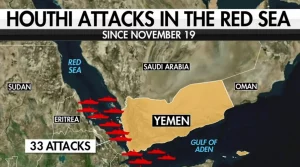Interview with Dr. Aisha Jumaan

Question 1—On Tuesday, President Trump said that the US will stop bombing Yemen because the Houthis said they would “not be blowing up ships anymore.” Trump added that the Houthis “capitulated” and “don’t want to fight anymore”. Is Trump telling the truth; did the Houthis ‘give up’?
Aisha Jumaan— Based on the attached statement from the Sultanate of Oman Foreign ministry, it seems that the ceasefire between the US and Ansar-Allah in Sana’a was reached in a mutual way. Ansar-Allah, in an interview with DropSite by one of the Ansar-Allah leaders said, “We do not consider ourselves at war with the American people,” said Mohammed al-Bukhaiti, a member of Ansar Allah’s political bureau and a longtime spokesperson for the Houthis. “If the U.S. stops targeting Yemen, we will cease our military operations against it.”
This was in response to comments made by President Trump and Secretary of Defense indicating that they will stop bombing Yemen if Ansar-Allah agrees to stop attacking US ships. “The choice for the Houthis is clear: Stop shooting at U.S. ships, and we will stop shooting at you,” Trump wrote in a post on TruthSocial on March 31. Defense Secretary Pete Hegseth said in an interview with Fox News: “The minute the Houthis say, ‘We’ll stop shooting at your ships, we’ll stop shooting at your drones,’ this campaign will end. But until then, it will be unrelenting.”
Based on reports coming out from Yemen, Ansar-Allah understand that the agreement does not mean they stop attaching Israel.
A recent statement by President Trump said “We take their word for it… We hit them very hard. They had a great capacity to withstand punishment,” he said. “You could say there’s a lot of bravery there.”
A Spokesman at the Foreign Ministry said today that, following recent discussions and contacts conducted by the Sultanate of Oman with the United States and the relevant authorities in Sana’a, in the Republic of Yemen, with the aim of de-escalation, efforts have resulted in a ceasefire agreement between the two sides.
In the future, neither side will target the other, including American vessels, in the Red Sea and Bab al-Mandab Strait, ensuring freedom of navigation and the smooth flow of international commercial shipping.
The Sultanate of Oman expresses its gratitude to both parties for their constructive approach that led to this welcome outcome, and hopes that it will lead to further progress on many regional issues towards achieving justice, peace, and prosperity for all.
Question 2— Can you expand on your first answer: Does the agreement between the US and Yemen mean that US warships will be allowed to transit the Red Sea even though Trump is still providing bombs and weapons to Israel?
Aisha Jumaan—I don’t know the specifics of the agreement reached between the U.S. and Ansar-Allah. However, based on an article by Haaretz, many of the arms transfer occur by planes. Also, it seems that most sea cargo of weapons to Israel go through the Mediterranean to Haifa and Ashdod. Eliat port has been declared bankrupt due to the blockade of the Red Sea.
A dizzying pace, then a drop: How U.S. arms shipments to Israel slowed down, Haaretz. Publicly available flight tracking data shows how many U.S. arms shipments have arrived in Israel each month since the Gaza war started, revealing a sharp rise and then gradual tapering off in the pace of deliveries
Question 3— The Pentagon said on Tuesday that US Central Command forces have struck 1,000 targets in Yemen since March 15, killing roughly 200 Yemeni civilians and destroying much of the country’s critical infrastructure. How bad is the situation on the ground for ordinary people? (Is there enough food, water and medical supplies?)
Aisha Jumaan—The number of civilians killed and injured might be much higher than the reported ones. It is possible that many of the injured died due to severe injuries and lack of appropriate medical care in Yemen. The health system in Yemen is only operating at less than 50% since most of the health centers were bombed by the Saudi led coalition.
The second largest port for importing fuel and gas was destroyed by the U.S. resulting in severe fuel and gas shortages. People are waiting in lines for up to 12 hours and they still can’t get fuel for their cars. Here is what one person in Sana’a wrote.
This person says I went to stay in line to get fuel and when I left there were 45 cars before me.
The U.S. and the Israeli bombed Hodeidah port making it difficult to import food, fuel and essential goods into the country. There are about 17 million people in Yemen who need humanitarian assistance. Millions of Yemeni children suffer from malnutrition. This will affect their cognitive development and will affect them for generations to come.
Here are the concerns voiced by Dr Alwazir.
He is a prominent political figure in Yemen. He lives outside Yemen now.
Today, politics have entered the arena and has produced positive results in the ceasefire agreement between Yemen and America. However, the huge losses in infrastructure cannot be easily compensated for, and they are all very significant, whether the destruction of Ras Isa Port or the destruction of Hodeidah Port. Both ports are the lifeblood of the valiant Yemeni people and the only outlets for the economy. This is what saddens me greatly and pains me greatly, due to the serious consequences for the people and their daily lives.
The enemy is trying to subjugate our economy and force us to obtain our imports of food, medicine, and other necessities, as well as oil and gas, from Mokha Port and Ma’rib Governorate. This will place our economy in the hands of others and will place our economy under their supervision and control.
The destruction of the cement factories has also greatly damaged our economy, which is another important nerve center for the economy. It has also damaged three major power plants, the infrastructure at Sana’a Airport, and three Airbus aircraft. Affiliated with Yemenia Airlines…
All of this pains and grieves me, yet we will be patient and seek reward and recompense, and perhaps God will bring about something new after that…
I only mention this because of the necessity of finding import alternatives other than what the enemy is trying to bring us to. We must think deeply about the means to achieve this and apply all possible pressure to achieve it. We must also include the issue of compensation for these unjust damages in any upcoming political meetings or negotiations, and involve other parties or countries to also pressure for compensation for what was destroyed, just as the State of Oman mediated between us and America in this agreement, something I have repeatedly stated in several previous articles
and others…
I am also attaching a presentation that I gave at UW on the impact of U.S. war in Yemen
Question 4— Israel is very angry at Trump for making a deal with Yemen without consulting them. The headline in Wednesday’s Times of Israel says: Trump ditched Israel with surprise Houthi truce. That doesn’t bode well on Iran… Days after Yemeni group caused untold economic damage by hitting Ben Gurion Airport , the US president blindsided his allies; this has no doubt unsettled Jerusalem amid nuclear talks. Here’s more from the article:
…Without coordinating with Israel or other allies, he announced during a White House meeting that the Houthis had agreed to stop attacking shipping lanes in the Red Sea and said that the US would halt its attacks on the Iran-backed group…. Israel, it seems, is on its own in the fight against the Houthis. Times of Israel
Do you think that Trump might be shifting away from “unconditional support” for Israel or do you think the Zionists still control US foreign policy in the Middle East?
Aisha Jumaan—I am not sure that Trump is shifting away from the “unconditional support” for Israel. I think that there are multiple factors at play:
- National security advisor Waltz relationship with Netanyahu. It is possible that Trump may have felt betrayed. Article below talks about that.
- Trump’s visit to the Middle East. It is possible that concerns that Ansar-Allah may fire missiles against Saudi during his visit would be embarrassing for all parties involved.
- Ansar-Allah announced that all ships containing oil imported from the U.S. will not be allowed to go through the Red Sea or Arabic Sea. This would have had a huge impact on export of US oil to Asia.
It is possible that the US aircraft carriers in the Red Sea would be targeted by the announcement of a list of sanctions on US crude oil and the prevention of cargo ships from passing through the Red Sea, Bab al-Mandab, and the Arabian Sea. This, had it been implemented on May 17, 2025, would have led to significant damage to the US economy and its international standing, weakening its political and military influence, or sparking a comprehensive, uncompromising war in which other countries might intervene, given the nature of the situation and the geopolitical and logistical consequences.
In this context, the US had no choice but to conclude this agreement to overcome the Yemeni ban on ships carrying US crude oil from passing through the Red Sea, the Arabian Sea, and Bab al-Mandab. This was explicitly announced by US Secretary of State Marco Rubio, who was present at the White House when Trump announced the agreement. Secretary Rubio said that the goal and purpose of this agreement is to facilitate the passage of cargo ships carrying US oil in the Red Sea…
4. It is also possible that the loss of 2 F-18 aircrafts and about 9 MQ-9 Reapers, in addition to the constant attacks on the air carriers, and the high price tag to the attacks on Yemen convinced the military that the losses are too great.5. Steve Witkoff does not seem to care much for Netanyahu. Trump seems to trust him and wants a deal with Iran. Netanyahu, on the other hand, wants to sabotage that.
Question 5— People around the world have expressed their admiration for the Yemeni people for showing unwavering courage in the face of evil. Jesus said, “Greater love hath no man than this, that a man lay down his life for his friends.” No group of people has better embodied that ideal than the people of Yemen who have put themselves at great risk to stand up for justice and humanity. What is so special about these people, their culture and their beliefs?
Aisha Jumaan— I would say that there are multiple factors for why the Yemeni people decided to stand up for Gaza, knowing full well the price they will pay. Yemen was under daily airstrikes by the US supported Saudi led coalition for 8 years. Yemen has been under a blockade since 2015, and Yemeni know first-hand the consequences of starvation, disease and economic collapse.It is important to note that despite the Saudi led blockade on Yemen since 2015, Yemen never tried to block the red sea to try to lift the blockade; it only used for Gaza.
Some of the factors that influenced Yemeni to stand up for Gaza are:
Yemeni are fiercely independent and can’t stand colonization. Yemen is called the graveyard of the invaders because they fought all those who tried to invade Yemen including the Turks. Aden was a protectorate of the English Empire, but to be able to rule, the British had to change the demographic of the city and bring in non-Arabs. At one point, the Yemeni population of Aden was only 20%.
Yemen is an old country with many civilizations that shaped the Yemeni people. In the Quran, there is a whole chapter about the Queen of Sheba and her wisdom and the strength of the Yemeni people. Yemeni are kind and generous and learned to stand up for what they think is right. There is a proverb that says, if you don’t have a friend, get yourself a Yemeni friend. Another proverb says that who did not learn to behave by time, Yemen will teach him to behave.
Tribal norms in Yemen are built on community, not individuals, which makes the correcting of the wrong done to one person, the responsibility of the whole community. One of the main norms is to stand up to injustices, and for the people of Yemen, Palestine is a central issue because of the injustices that the Palestinians have been subjected to. Yemeni believe that you have to do something to counter injustices. The prophet Mohamed, peace be upon him said, you have to change injustice with action, if you can’t then with words and if you can’t then wish for the change in your heart and this is the weakest of your faith.
Yemeni are proud of their heritage and therefore, are the least affected by Western propaganda and current western culture. They are good fighters and for them, honor is essential. They would rather die in a battle and stand for their principals than live in humiliation. These values are instilled in them as kids. Prophet Mohamed said “Faith is Yemeni and Wisdom is Yemeni”, the Yemeni people have come, they are gentle and softhearted.


Dr. Aisha Jumaan is the founder and president of Yemen Relief and Reconstruction Foundation. The foundation aims to increase awareness among the US public and policymakers about the humanitarian crises underway in Yemen, support relief and reconstruction efforts, and facilitate campaigns to bring peace to the country. Aisha has over 35 years of experience in public health, including viral vaccine preventable diseases, cervical and breast cancer research, surveillance, maternal, child health and nutrition, and primary health care.




